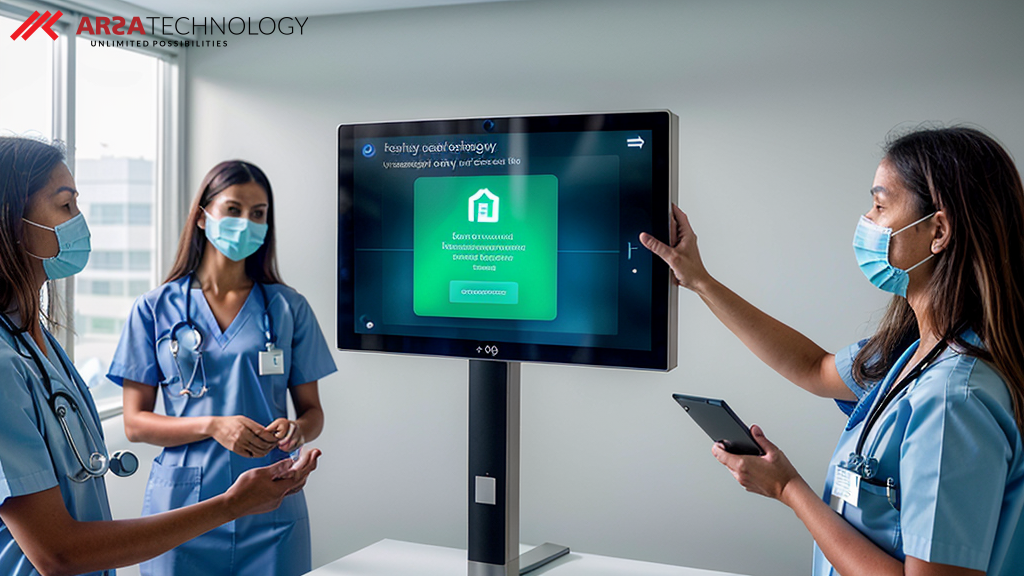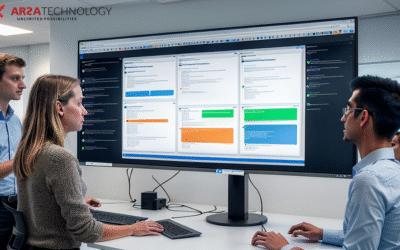Introduction: Overcoming HIPAA Compliance Challenges in Healthcare Physical Access Control
The healthcare industry operates under stringent regulatory frameworks, with HIPAA (Health Insurance Portability and Accountability Act) standing as a cornerstone for patient data privacy and security. While digital data protection often takes center stage, physical access control to sensitive areas within healthcare facilities is equally critical for maintaining compliance and safeguarding patient information. Manual systems, outdated badge readers, or generic keycard access present significant vulnerabilities, leading to potential breaches, administrative overheads, and non-compliance risks.
For healthcare organizations striving for ironclad security and operational efficiency, migrating to advanced biometric solutions is no longer a luxury but a necessity. ARSA Technology’s Face Recognition API offers a robust, secure, and compliant pathway to modernize physical access control, addressing the core pain point of HIPAA compliance challenges head-on. This article explores the strategic advantages of transitioning to a state-of-the-art facial recognition system, focusing on how ARSA’s API empowers developers and organizations to build secure, efficient, and compliant access solutions.
The Evolving Landscape of Healthcare Security: Why Traditional Methods Fall Short
Traditional physical access control systems in healthcare, such as ID badges, PINs, or even fingerprint scanners, often introduce a range of vulnerabilities and inefficiencies. Badges can be lost, stolen, or shared, compromising security. PINs can be forgotten or easily compromised. Even fingerprint scanners can face issues with hygiene, wear and tear, or false rejections, leading to frustration and delays in critical situations. These methods not only pose security risks but also create administrative burdens related to issuance, replacement, and auditing.
In a healthcare environment where every second counts and data integrity is paramount, these shortcomings translate into tangible risks:
* Compliance Gaps: Failure to adequately secure physical access points can lead to HIPAA violations, resulting in hefty fines and reputational damage.
* Operational Inefficiencies: Managing physical credentials, handling forgotten access codes, and dealing with security incidents divert valuable staff time and resources.
* Security Vulnerabilities: Unauthorized access to patient records, medication storage, or restricted treatment areas poses direct threats to patient safety and data privacy.
The need for a more secure, reliable, and user-friendly access control system is clear. This is where the strategic migration to a sophisticated biometric solution like ARSA Technology’s Face Recognition API becomes a game-changer for healthcare providers.
ARSA’s Face Recognition API: A Foundation for Secure Healthcare Access
ARSA Technology’s Face Recognition API is engineered to provide high-performance, accurate, and secure identity verification. For healthcare, this translates into a powerful tool for managing physical access to sensitive areas such as operating rooms, pharmacies, data centers, and patient records archives. By leveraging advanced AI, the API ensures that only authorized personnel gain entry, significantly bolstering security protocols.
The core functionality of the Face Recognition API revolves around its ability to accurately identify individuals based on their unique facial features. This capability is crucial for implementing secure identity verification solutions that are both efficient and compliant. To understand the seamless capabilities of our Face Recognition API, try our interactive demo on RapidAPI. This allows developers to experience firsthand how the API processes and verifies facial data, providing a clear understanding of its integration potential without needing to write any code.
Beyond mere identification, ARSA’s API is designed with enterprise-grade security and privacy in mind, which is non-negotiable for healthcare. It provides the foundational technology for:
* Real-time Access Control: Granting or denying entry instantly based on verified identities.
* Audit Trails: Creating immutable logs of access events, crucial for compliance reporting and incident investigation.
* Enhanced Security Layers: Integrating seamlessly with existing security infrastructure to create multi-factor authentication systems.
Strategic Migration: A Phased Approach to Enhanced Security and Compliance
Migrating to a new access control system, especially one involving advanced biometrics, requires careful planning and execution. For healthcare organizations, the process should be strategic, phased, and focused on maintaining continuous operations while ensuring compliance.
1. Assessment and Planning: Begin by identifying critical access points, evaluating existing infrastructure, and defining specific security and compliance requirements. This phase involves understanding which areas require the highest level of biometric security and how the Face Recognition API will integrate with current systems.
2. Pilot Implementation: Start with a controlled pilot in a non-critical area or with a small group of users. This allows development teams to test the integration, gather feedback, and fine-tune the system in a low-risk environment. It’s an opportunity to optimize performance and ensure a smooth user experience.
3. Data Handling and Privacy Protocols: A paramount concern for healthcare is patient and employee data privacy. When migrating, organizations must establish clear protocols for handling biometric data, ensuring it is encrypted, stored securely, and processed in a manner that strictly adheres to HIPAA guidelines. ARSA Technology’s API is designed to facilitate these stringent requirements, offering robust data protection features.
4. Integration Strategy: While the ARSA Face Recognition API handles the complex AI processing, developers will integrate it into their existing physical access control software or build new applications. The focus here is on leveraging the API’s capabilities to enhance existing workflows, not to replace entire systems from scratch. This strategic integration minimizes disruption and maximizes ROI.
5. Training and Adoption: A successful migration hinges on user acceptance. Comprehensive training for staff on the new system, highlighting its benefits in terms of security and ease of use, is essential for smooth adoption.
Beyond Basic Recognition: The Role of Liveness Detection in Healthcare Security
While facial recognition is powerful, its effectiveness in preventing sophisticated fraud can be significantly enhanced by integrating liveness detection. In healthcare, where the stakes are incredibly high, ensuring that a live person is present at the access point, rather than a photo, video, or 3D mask, is critical.
ARSA Technology also offers a dedicated Face Liveness Detection API, which complements the Face Recognition API by adding an essential layer of anti-spoofing security. This API verifies that the face presented is indeed a live human being, effectively thwarting attempts at unauthorized access using static images or other deceptive methods. For applications requiring the highest level of assurance, combining both APIs creates an impenetrable barrier against fraud, ensuring that physical access is granted only to legitimate, live individuals. Learn more about preventing fraud with liveness detection to see how this crucial technology can further fortify your security posture. To test the robustness of our Liveness Detection API, test the Liveness Detection API on RapidAPI.
Business Outcomes: ROI, Efficiency, and Competitive Advantage
The migration to ARSA Technology’s Face Recognition API for healthcare access control delivers tangible business outcomes far beyond mere compliance:
- Enhanced Security Posture: Significantly reduces the risk of unauthorized access and data breaches, protecting patient privacy and organizational reputation.
- Streamlined Operations: Eliminates the administrative burden of managing physical credentials, reducing costs associated with replacement and auditing. Staff can access areas more quickly and efficiently.
- Assured HIPAA Compliance: Provides a verifiable, auditable, and secure method of controlling access to protected health information (PHI), helping organizations meet and exceed regulatory requirements.
- Improved User Experience: Offers a frictionless and convenient access method for authorized personnel, enhancing satisfaction and productivity.
- Future-Proofing Security: Adopting advanced biometric technology positions healthcare organizations at the forefront of security innovation, ready to adapt to evolving threats and regulatory landscapes.
- Cost Savings: While there’s an initial investment, the long-term savings from reduced security incidents, lower administrative costs, and avoidance of compliance fines can be substantial.
By making this strategic shift, healthcare providers can transform their physical security infrastructure from a potential liability into a robust asset that supports their mission of patient care while safeguarding sensitive data.
Conclusion: Your Next Step Towards a Solution
The imperative for robust, compliant, and efficient physical access control in healthcare has never been greater. Migrating to ARSA Technology’s Face Recognition API offers a clear, strategic path to address the critical challenges of HIPAA compliance, enhance security, and streamline operations. By embracing this advanced biometric solution, healthcare organizations can protect patient data with unparalleled confidence, improve staff efficiency, and secure their facilities against evolving threats.
The journey towards a more secure and compliant future begins with a strategic decision to upgrade your security infrastructure. ARSA Technology is committed to providing the tools and support necessary for a successful transition, empowering developers and organizations to build intelligent, secure, and compliant access solutions.
Ready to Solve Your Challenges with AI?
Discover how ARSA Technology can help you overcome your toughest business challenges. Get in touch with our team for a personalized demo and a free API trial.







